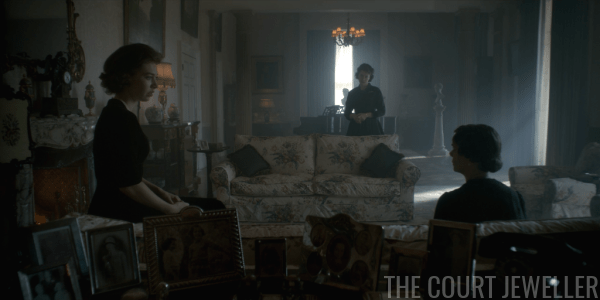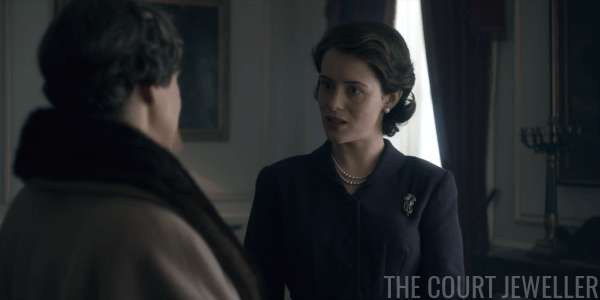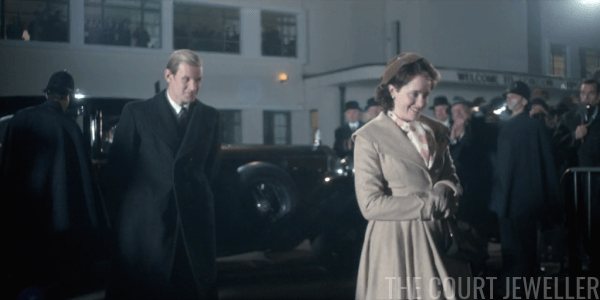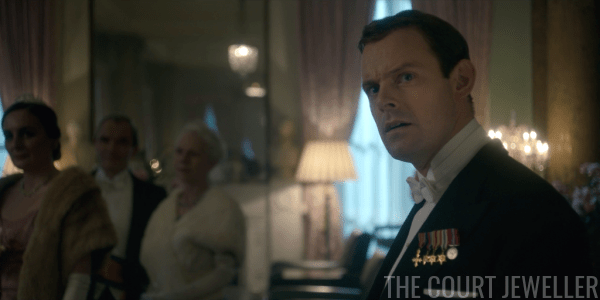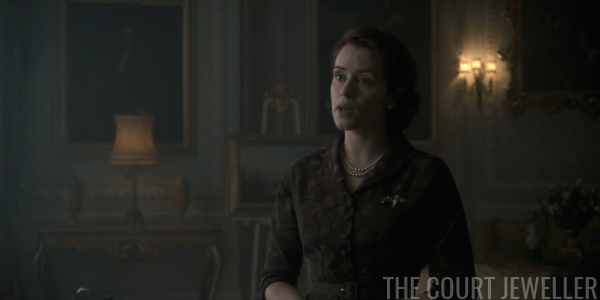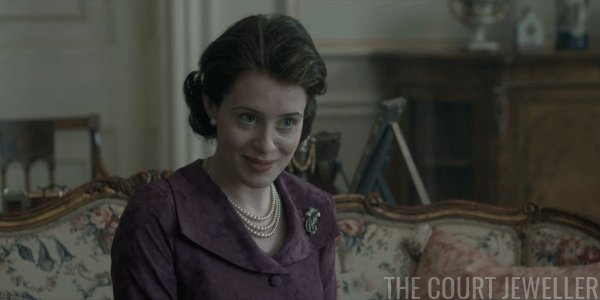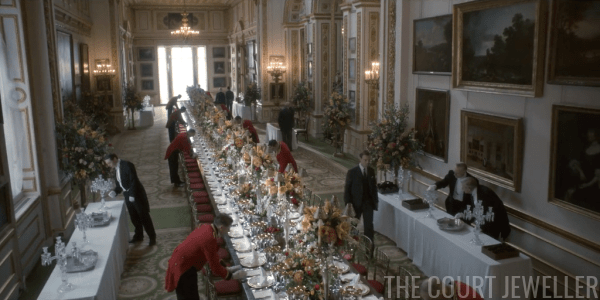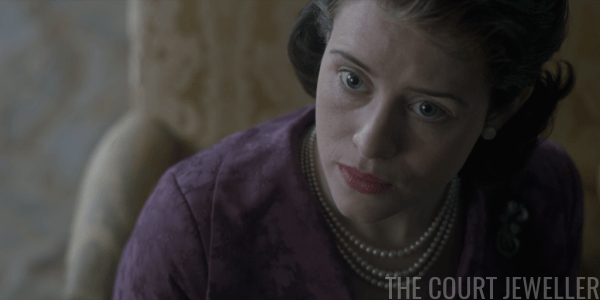
Time for another journey into the past with Netflix’s The Crown! This recap covers the ninth episode of season one, “Assassins.” If you’ve missed any previous recaps, you can catch up here!

We begin with a helpful note that it’s 1954. Lord Porchester (later the 7th Earl of Carnarvon) has made his way into disagreeable central London for an important date: he’s asking his girlfriend, Jean Wallop, to marry him.

Jean’s wearing a lovely era-appropriate necklace and earrings, and she wants to accept his proposal, but she’s nervous that he’s still carrying a torch for her.

And by “her,” she means the Queen. Porchey and Elizabeth are old friends from the racing world. Porchey claims that he doesn’t carry a torch for her, and besides, she was only ever interested in Philip. Meanwhile, Elizabeth waits at Buckingham Palace for her drunken louse of a husband to come home.

He staggers in, and she pretends to be asleep. Things are just peachy in the Mountbatten-Windsor marriage.

The Churchills are in the country at Chartwell. Clemmie takes a telephone call from Jock Colville about Winston’s 80th birthday celebrations.

He’s painting in the garden, and she comes out to tell him about the artist, Graham Sutherland, who’s been chosen to paint his birthday portrait.

Churchill will also undoubtedly be thrilled that Anthony Eden has arrived back in England, all better after his recent surgery in America.

We also get our first look at Lady Eden: Clarissa Spencer-Churchill. Clarissa was Eden’s second wife; she also happens to have been Winston Churchill’s niece. All in the family!
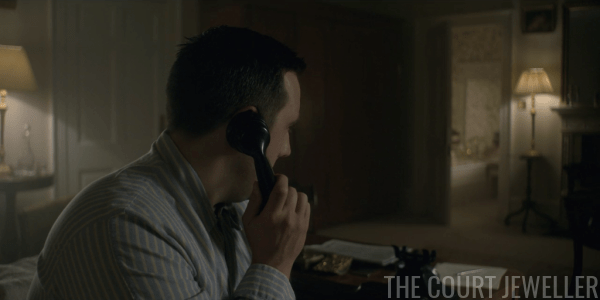
While his wife-to-be is taking a bath, Porchey takes a call from the woman he’s definitely not holding a torch for.

Elizabeth wants to talk horses. If she was nervous in previous episodes about her lack of knowledge, it’s clear here that she’s almost an expert on racing, and Porchey is her close confidant and equal in that field. And she’s lonely.

Graham Sutherland arrives to paint Churchill’s portrait. He’s blustery, as per usual, talking about art and accuracy and truth. Clemmie, who has a brooch on in this scene, is mostly amused. After Sutherland leaves, the Churchills discuss him. Winston thinks Clemmie has a crush, and she says he’s quite right. She tells him that he shouldn’t be worried about the portrait, because she thinks this painter isn’t “an assassin.”

Meanwhile, at Royal Ascot, the Queen’s horse, Aureole, is triumphant. She’s wearing the “inspired by” bow brooch, and she is beyond excited.

Philip is so bored and annoying that he can’t even be happy about it. Also, he’s clearly jealous of Porchey.

Margaret, in her pearls and her sunglasses, is the only one who notices.

The horse gets a hero’s welcome back at the stables.

Porchey and Elizabeth reminisce, getting all nostalgic about the late king and his equine instincts. They discuss the possibility of running the horse in an American race. Porchey’s against it, and Elizabeth’s surprised, because she knows his girlfriend is American. Porchey tells her that he’s engaged now, and that she’d approve of her. Elizabeth wants to meet her.

Margaret arrives, smoking a cigarette on a white horse, as Porchey leaves. She calls him “the one who got away” from Elizabeth, who thinks she’s mad. It’s too bad Philip doesn’t like horses, Margaret says. She also insinuates that he’s fooling around with other women.

Eden arrives to see Churchill, who makes him wait. Eden wants him to stand down. Churchill says he will, at the right time. There’s shouting and growling. There’s also a confusing time reference; Eden says that “two months ago” Churchill was effectively dead. The stroke happened in episode seven; episode eight included the entire Commonwealth tour, which was almost six months long. The time continuity in this show is just the worst. The meeting ends when Sutherland arrives to work on the portrait.

Sutherland has brought his wife, Kathleen, to assist as he sketches. Churchill is a mess as they get started, both figuratively and literally. Sutherland even has to smooth down Churchill’s hair. There’s lots of discussion about art supplies and experience and things. Churchill wants to prove that he’s a better painter, so there’s lots of empty boasting, until the PM eventually just falls asleep. He eventually wakes up and tells Sutherland that he wants the portrait to be flattering. These “Churchill gets painted” scenes are awfully lengthy.

At the palace, Elizabeth is playing solitaire while wearing the “ribbon” brooch and pearls. She takes a call from Porchey. He’s got a report on Aureole, but first he complains about how long it takes to put in a call to her. She offers to get him a direct line.

Later, Philip wants to know all the monetary details of putting Aureole out to stud.

Elizabeth, who is wearing her rings while she moisturizes, is sort of exasperated with his questions.

Philip needles her more by comparing the horse to Porchey’s father, Lord Carnarvon, who had supposedly had so many affairs that he’d sired an entire generation of British aristocrats. And then he goes off to gallivant with Mike Parker again.

Back to Churchill, who has tracked down samples of Sutherland’s modernist work. And then cut to Sutherland, who is perusing a book of Churchill’s paintings. Each tries out the other’s style. When Sutherland comes back to work on the portrait for a final time, Sutherland asks him for silence. Churchill agrees, and then talks incessantly. Then they talk about Churchill’s paintings and Sutherland’s analysis of the emotions they evoke. And then Churchill asks about Sutherland’s paintings, and they do the dance all over again. Eventually, they start talking about a child each has lost.

At the stables, Elizabeth’s engagement and wedding rings are on display as she waits for Porchey to arrive. They look at three different mares and basically play matchmaker for Aureole.

We skip ahead to Churchill’s 80th birthday: November 30, 1954. He gets a glass of champagne and an enormous cake. He blows out precisely one candle.

With her pearls on and a drink in her hand, the Queen Mum watches Churchill’s car drive through London on television.

Michael Adeane joins the Queen at the palace to watch the Westminster Hall celebration on television.

At Westminster Hall, Clemmie helps Churchill climb the stairs before he can give his speech. We cut back and forth between Churchill and others watching it on television. He jokes about standing down and about the modernist painter of his portrait. Churchill also reminds everyone that the portrait Sutherland painted represents Churchill, the office of the prime minister, and the entire government. The painting is unveiled, and Churchill scowls. Sutherland looks humiliated. (Churchill really did hate the portrait, but in real-life, he got to see it before it was unveiled.)

We get a quick shot of Clemmie’s earrings as she worries about his reaction.

Churchill jokes about the “fine, patriotic piece of modern art,” and the Queen, in her pearls, shakes her head in response. Churchill is, after all, inserting the individual into the moment rather than the institution. Not good.

Churchill ends up rejecting the painting, and Sutherland goes to Chartwell to confront him. Churchill just hates it, because it makes him look frail and vulnerable and old. Churchill wants to look young and sprightly, basically. Sutherland points out that it would be unwise to reject it, because it was commissioned by parliament. Churchill spits that they should have chosen a better artist. Sutherland asks him to take some time to think about it, and that it’s not his fault that Churchill looks old, because Churchill is old.

Churchill orders Sutherland out, and then he pouts a little with his look-a-like painting.

Later, Clemmie wears pearls as Churchill admits to her that Sutherland was right about everything. He’s going to stand down. Clemmie thinks it’s a good decision. (In real life, this happened in April 1955.)

Churchill meets with the Queen, who wears the “bird” brooch as she accepts his resignation.

Churchill, who always insisted on standing during audiences, sits and chats with Elizabeth over a cup of tea. She praises his long service to the nation and thanks him. Eden will take over.

In a fatherly gesture, Churchill kisses her on the forehead before he leaves, and she is teary-eyed when he goes.

Eden’s car pulls up right behind as Churchill’s departs. The two men shake hands as they officially pass the baton of government power.

Afterward, the Queen and the Queen Mum discuss appropriate tributes for Churchill. Renaming London Airport? Too impersonal. The Queen Mum suggests that Elizabeth and Philip could pay a great compliment by going to a dinner at Downing Street. Elizabeth says she’ll ask Philip. Her mother says she should tell him, not ask him.

At the stables, Philip sort of “hmmms” about the dinner. They’re waiting to see if their horse match-making pays off. He and Porchey sort of stare weirdly at each other. The horses are, well, compatible. Philip makes lots of loud jokes, Elizabeth does lots of shushing, and then she congratulates Porchey. Lots of heavy-handed metaphors in the writing of this episode, guys.

Marital bliss.

Back at the palace, Elizabeth dresses for the dinner at Downing Street. Wearing the Lover’s Knot Tiara and Queen Victoria’s Golden Jubilee Necklace (with the earrings that the production made to “go” with Queen Alexandra’s Wedding Necklace), Elizabeth scolds Philip for thinking anything’s going on with Porchey. She notes that marriage to Porchey might have been easier, but she’s only ever loved Philip.

She asks Philip if he can honestly say the same. Dressed in his Garter finery, he says … nothing.

At the dinner we get tiaras here…

…and tiaras here as the Queen toasts Churchill.

Clemmie wears the same strange floral tiara they had her in at the coronation.

At Chartwell, Sutherland’s portrait is burned. In real life, Clemmie did have the portrait destroyed, and the card at the end of the episode notes that it’s generally considered to be a lost masterpiece.


